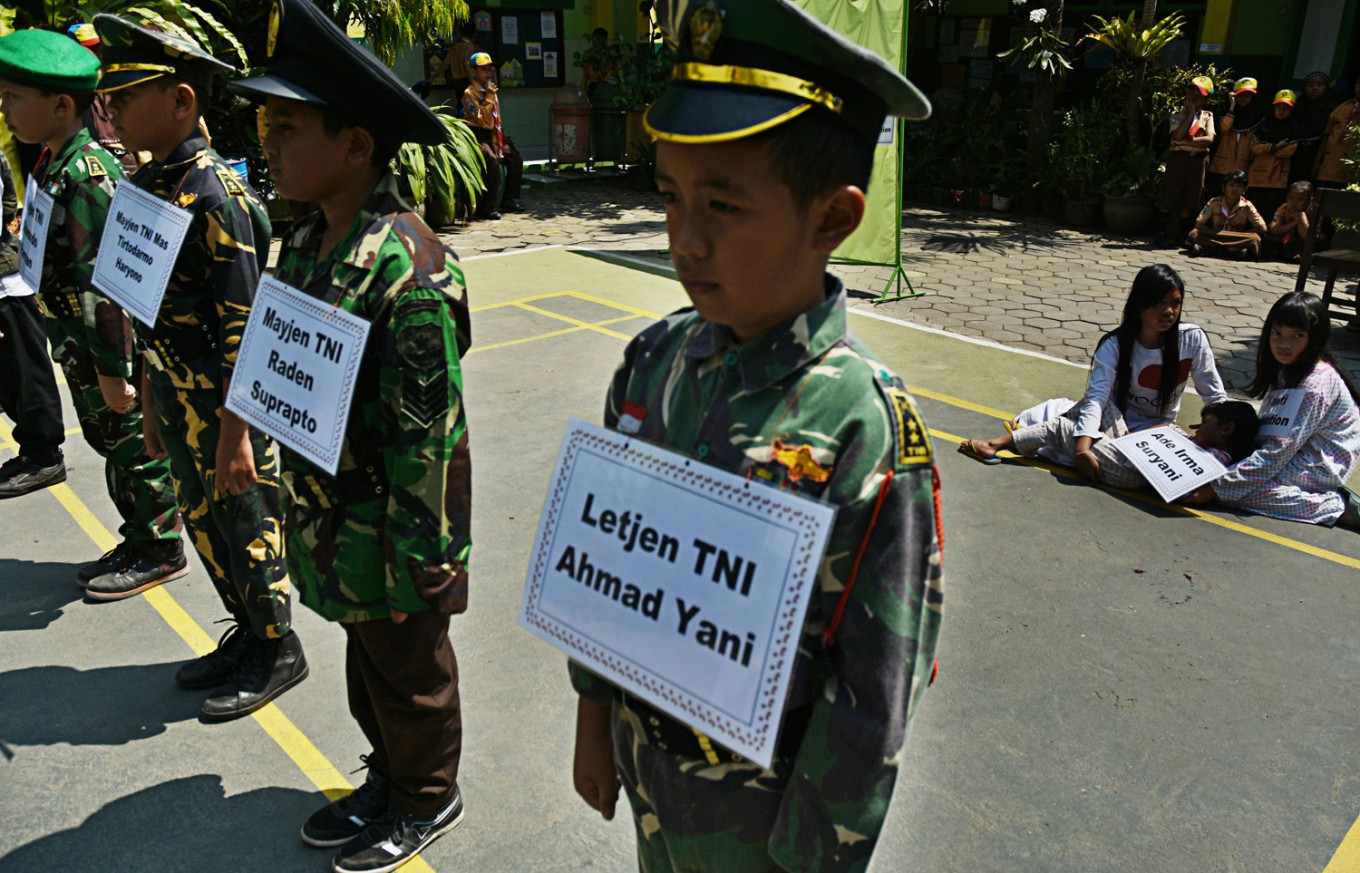Popular Reads
Top Results
Can't find what you're looking for?
View all search resultsPopular Reads
Top Results
Can't find what you're looking for?
View all search resultsThe act of telling: Nadiem asked to teach students about human rights abuses
A new survey by The National Commission on Human Rights (Komnas HAM) in collaboration with the Kompas Research and Development Department (Litbang) found that people under 22 years old were largely unaware of past human rights abuses in the country.
Change text size
Gift Premium Articles
to Anyone
W
hat did happen in the 1998 Trisakti shootings? Many historians and human rights activists would recount it as a tragedy, in which soldiers opened fire at unarmed students at Trisakti University in Jakarta during a protest demanding president Soeharto step down. The shootings claimed the lives of four students and injured dozens of others.
However, if you ask the same question of David Christian, a senior high school student in Bandung, West Java, he would describe it simply as an event when “stray bullets struck rioting students”.
Jessica, a 17-year-old student at a vocational high school in Jakarta, said she was taught about the 1965 massacre as the killing of military generals by the Indonesian Communist Party (PKI) – teaching that made no mention of the government’s subsequent purge of alleged PKI members and sympathizers.
David and Jessica are part of Indonesian younger generations who do learn about some of the darker chapters of Indonesia’s history in schools, but only on the surface and obscured by past propaganda.
This has prevented students from knowing Indonesia’s true history, including many of the past human rights abuses that remain unresolved until this day.
A new survey by the National Commission on Human Rights (Komnas HAM), in collaboration with the Kompas Research and Development Department (Litbang), found that people under 22 years old had little awareness of past human rights tragedies in the country. These included the 1997 to 1998 riots and activist abductions and the 1965 PKI purge.
The young respondents, called Gen Z in the study, knew little about the critical traumas of the country’s history, which claimed thousands of lives and shifted Indonesia’s political course.
The survey result has prompted Komnas HAM to ask the Education and Culture Ministry to teach the history of the country’s human rights abuses in school.
Komnas HAM commissioner M. Choirul Anam said the government was responsible for the ignorance as the events were not covered in formal school curricula.
“[The survey] shows the challenge that Nadiem Makarim faces as the education and culture minister to provide not just an innovative education but also a civic one so that such violations won’t happen again in the future,” said Komnas HAM commissioner Choirul Anam.
He said the tragedies should be part of the school curriculum so that Indonesians would always remember the nation had gone through “dark” days.
“We should prevent this dark history from repeating itself. That’s the challenge for Pak Nadiem Makarim. Education is not only about innovation but also about finding the truth,” said Choirul.
The study found that about 50 percent of Gen Z respondents were unaware of the 1965 tragedy and about 50 percent were also unaware of the events of 1997 to 1998.
The Komnas HAM-Litbang Kompas study was conducted from September to October 2019 and surveyed 1,200 respondents between the ages of 17 and 65 from 34 provinces in Indonesia.
The survey sought to capture societal perceptions of past human rights violations, many of which remain unresolved.
According to Litbang Kompas, the study was limited to five major unresolved cases of human rights abuses: the 1965 massacre, the mysterious shootings of 1983 to 1985, the 1998 human rights activist kidnappings, the 1998 Semanggi-Trisakti shootings and the May 1998 riots.
Choirul said the survey demonstrated the urgent need to address past cases of human rights abuses. More than twelve cases on human rights violations have been proposed to the Attorney General. Choirul called on the government to take them on.
The survey found that 71 percent of respondents hoped the past human rights violations would be addressed quickly.
However, 18 percent of respondents said such a resolution was unnecessary because the cases were too far in the past.
Respondents were pessimistic about the government’s will to pursue the cases.
Itje Chodijah, an education observer, said that the point of education is to teach young generations to think critically about what happened in the past. Presenting fact sheets without allowing an open discussion about past human rights violations would only lead to speculation and misleading context.
“Regardless of the political regime, it is still possible to include past human right violations into curricula. However, the delivering should not incite hatred. Instead, students should be taught how to prevent the past mistakes from happening again in the future and how to contribute to the nation,” she told The Jakarta Post via telephone.
Fasli Jalal, a former deputy education minister, echoed Itje by saying that the lessons of the past needed to be delivered through an open debate.
He also stated that eliminating mentions of one aspect of past events or providing a single version of a past human rights violation would only bring more harm than good.
“Teachers should facilitate students with such case studies; let them find the information, provide a fair dialogue and let students criticize and decide [what's right],” he said.
Education and Culture Ministry research and development head Totok Supriyanto said more information about the human rights violations could be added to the curriculum.
"We already have such lessons in our current curriculum. I am not sure how people are unaware of them," he said on Thursday. (trn)










